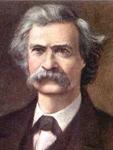Authors > Mark Twain

Mark Twain
Sex: Male
Country: AmericanBirth & Death: 1835-1910
Samuel Langhorne Clemens (November 30, 1835 – April 21, 1910), better known by his pen name Mark Twain, was an American author and humorist. He is most noted for his novel The Adventures of Tom Sawyer (1876) and its sequel, Adventures of Huckleberry Finn (1885), the latter often called "the Great American Novel."
Twain grew up in Hannibal, Missouri, which would later provide the setting for Huckleberry Finn and Tom Sawyer. He apprenticed with a printer. He also worked as a typesetter and contributed articles to his older brother Orion's newspaper. After toiling as a printer in various cities, he became a master riverboat pilot on the Mississippi River before heading west to join Orion. He was a failure at gold mining, so he next turned to journalism. While a reporter, he wrote a humorous story, "The Celebrated Jumping Frog of Calaveras County," which became very popular and brought nationwide attention. His travelogues were also well received. Twain had found his calling.
He achieved great success as a writer and public speaker. His wit and satire earned praise from critics and peers, and he was a friend to presidents, artists, industrialists, and European royalty.
Though Twain earned a great deal of money from his writings and lectures, he invested in ventures that lost a great deal of money, notably the Paige Compositor, which failed because of its complexity and imprecision. In the wake of these financial setbacks he filed for protection from his creditors via a bankruptcy filing, and with the help of Henry Huttleston Rogers eventually overcame his financial troubles. Twain chose to pay all his pre-bankruptcy creditors in full, though he had no responsibility to do this under the law.
Twain was born during a visit by Halley's Comet, and he predicted that he would "go out with it," too. He died the day following the comet's subsequent return. He was lauded as the "greatest American humorist of his age," and William Faulkner called Twain "the father of American literature."
Comment:
- Information Loading...
Your Comment: